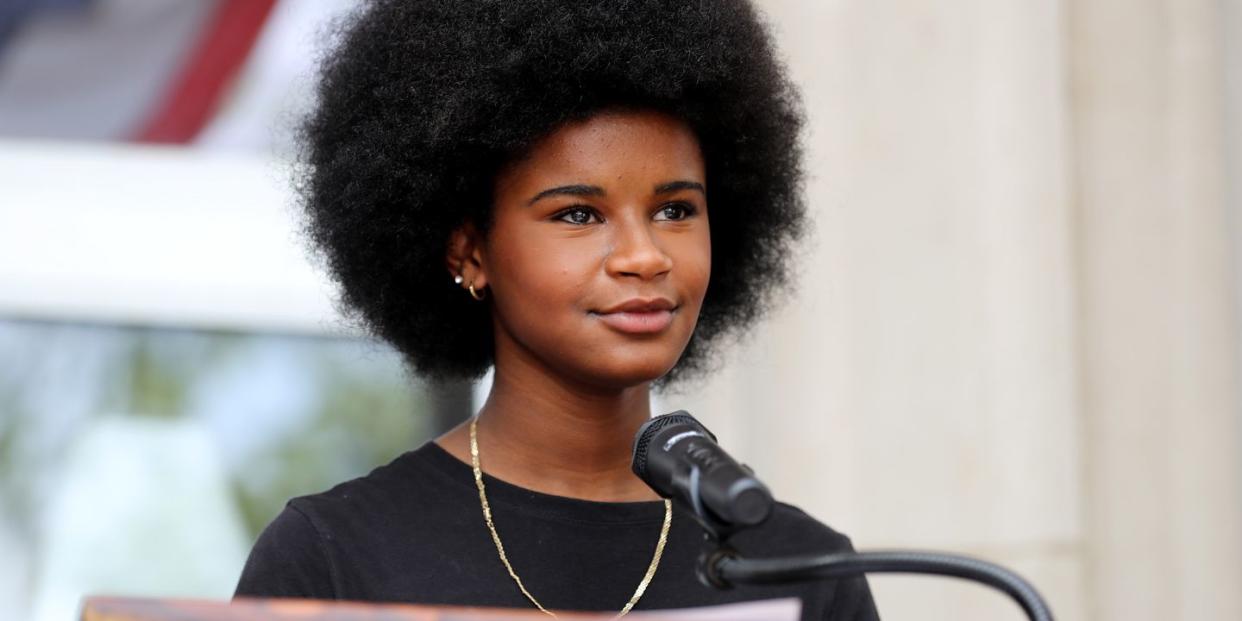'Let Us Help You Lead': Marley Dias on Why Young People Must Be Included in the Fight for Racial Justice

I’m 15, and I’ve been an activist for one-third of my life. It started when I was 10 and I noticed the lack of Black girl characters—like me— in the books that I read. So I started a book drive, #1000blackgirlbooks, that has since collected more than 12,000 books and sparked a movement across the publishing industry and in schools to promote diversity in children’s literature that’s long been dominated by white boy and dog protagonists. I was only in elementary school, but I saw the need, felt the passion, and made it my mission.
For the past four years, I have been talking to business leaders, educational administrators, teachers, and caregivers about the need to include youth voices in decisions that impact our world. More than ever, we see that when adults ignore or dismiss our opinions, we will make space for ourselves. We saw it with the Parkland students who turned tragic gun violence into a nationwide push for gun reform, and Greta Thunberg who has mobilized millions to take action against climate change.
Now, in the wake of the unjust deaths of George Floyd, Breonna Taylor, and Ahmaud Arbery, it's young people, often in small towns, who are leading the charge for progress. As a generation, we demand racial justice and equity. While we have our sights set on the future, what often gets lost in discussions about youth activism is just how sharply focused we are on today, right now, this very moment. Young people overwhelmingly bear the burden of poverty, mis- and under-education, sexism, racism, and pervasive violence. And in order to be the leaders of tomorrow, I know just how important it is to make change now, starting on a local level.
Last month, I was invited to speak at a rally in my hometown of West Orange, New Jersey. West Orange, like so many suburban towns in America, prides itself on being a “diverse community.” Almost 35 percent of the people speak a language other than English at home. Black people are more than a quarter of the population in this town, and according to school district data, 27 percent of the total student population is Black. One in five students are Hispanic or Latinx; eight percent are Asian. However, our school board and township council do not mirror these demographics. Our school board has one Black member, but no Latinx or Asian representation. And our township council has no visible person of color.
Although we have rallied together for a host of reasons, including the murder and assault of members of the Jewish community, I, in all honesty, never thought I would see my town come together to unite against the racial injustices that affect the Black community. It was great to see the residents—more than 2,000 people strong—commit to dismantling white supremacy and ending racism in all forms, and it was even greater seeing our leaders commit to doing something about it. But best of all, it was young people who organized the event, including one of my best friends from pre-school.
But we cannot affect real change alone. We need adults to help us end the ignorance that's bred in our homes and supported by our schools. We need adults to ensure our curriculum includes not only the study of African and Black people throughout history, but that it also offers context and careful examination of today's monumental current events.
So my mission goes far beyond just what’s in bedtime stories. In my elementary school, the Black figures we learned about were Rosa Parks, Martin Luther King Jr. and Harriet Tubman. In middle school, the fairly recent murders of Philando Castile, Alton Sterling, and the Parkland shootings were not addressed. What happens in the present moment is as important to our future as the past. So it is my hope that in the future, the murders of George Floyd, Breonna Taylor and Ahmaud Arbery will be covered in schools nationwide. Because all of us—students, teachers, and administrators—must be able to say the words “Black Lives Matter.” We must write them on chalkboards and in Google Classrooms. Educators must demonstrate that they support these words through the assigned readings and homework.
In order for us to be the change we wish to see in the world, we must see ourselves first—in fact and in fiction. That’s why I call upon policymakers, school board administrators, and all adults to put us in the picture. Give us space, hear us out, and most importantly, listen. To truly fight for our future, you must let us help you lead the way.
You Might Also Like
